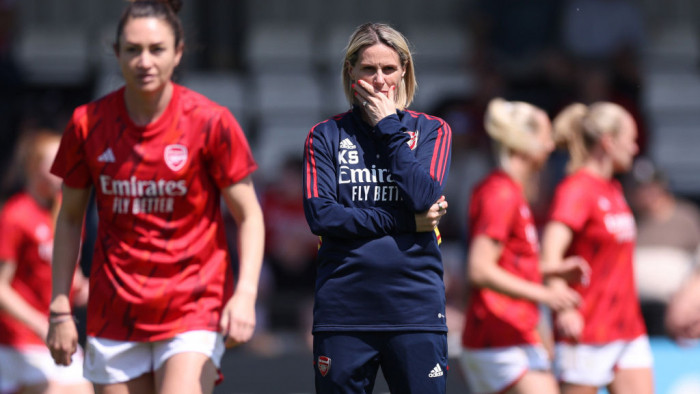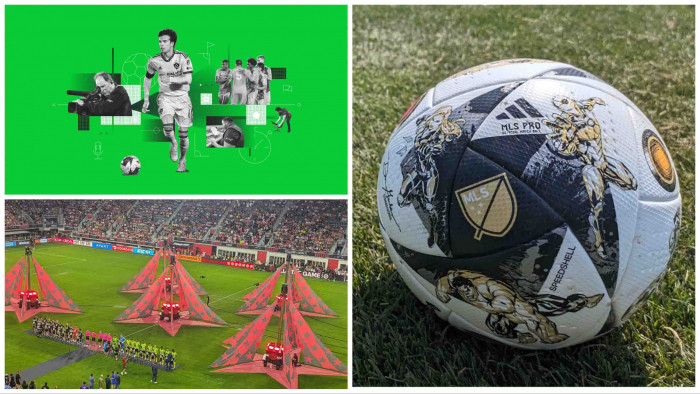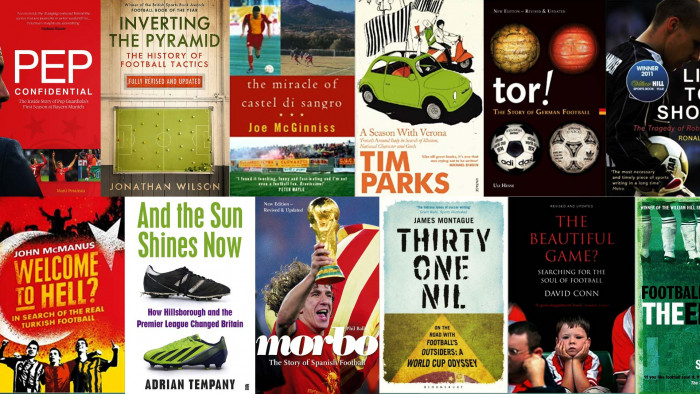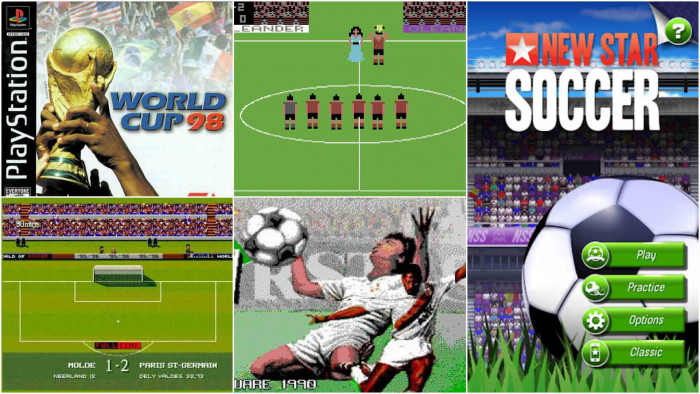How Arsenal's feud with Man Utd became the defining rivalry of the Premier League era
"It was great, because both sides properly hated each other."


Arsenal versus Manchester United is the definitive feud of the Premier League era. I will accept absolutely no whataboutery on this subject. It just is.
It was the greatest because both sides properly hated each other. Arsène Wenger and Sir Alex Ferguson hated each other. Patrick Vieira and Roy Keane hated each other. Martin Keown and Ruud van Nistelrooy hated each other. They all hated each other. And they didn’t hate each other due to geographic proximity, nor a long history of political tension. They hated each other purely because they were the two best teams in the country for eight years. And because they properly hated each other, and because they were the best, every meeting was gladiatorial. To emerge victorious, you’d need to withstand a 90-minute battering, both in terms of attacking brilliance and brute physicality.
As children of the ‘90s and of an area unrepresented by a good enough football club, practically every kid at my school was a glory supporter. A census of our glory support would reveal a smattering of Liverpool fans, the Reds’ reputation from the decade before still holding some allure, but the vast majority had been won over by the supremacy of Ferguson’s all-conquering perch-knocking four-league-titles-in-a-row United. With the watertight logic of a six-year-old, I thought that supporting Arsenal - one of the best teams in the country - made me a subversive champion of the underdog. I had one other kid for company. Even more than we supported Arsenal, we hated United.
Read more: The joy of living through the style and beauty of the Wenger era: where football became art

The two great managers in opposition during a league match at Highbury in 2005
It’s hard to imagine any manager taking to a press conference today, as Ferguson did in in 1997, to dismissively sneer: “He [Wenger] has come from Japan. And now he’s into English football and he is now telling everybody in England how to organise their football. I think he should keep his mouth shut. Firmly shut.” Dr Jozef Vengloš’ disastrous tenure at Aston Villa had emboldened the already proudly parochial Premier League’s hostility to managers from overseas. Wenger would change all that.
It seems baffling to think it took until his arrival, until 1996, that English football was introduced to the idea that elite athletes could probably perform better if they adhered to a carefully considered diet, rather than fuelling themselves with chips and pints - all the more impressive given Arsenal were notorious for their boozing culture prior to his arrival. Wenger’s approach to nutrition went beyond chucking a few greens to balance out the takeaways and pies. He was fastidious about researching what his players should eat, when they should eat and even how they should eat. According to Henry Winter, if a player absolutely had to have sugar in their tea or coffee “there was a Wenger-approved technique of stirring that would make all the granules absorb.”
Not content with changing their eating habits, he revolutionised the British approach to training, too. No more gruelling laps around a pitch, no more indulging players in idle kickabouts, no more drills that had no direct benefit to a footballer’s performance. He introduced plyometric exercises - at the time, practically only known by sprinters and long-jumpers - and strictly regimented his training routines. “We don’t overtrain by a minute,” Martin Keown would tell Wenger’s biographer Jasper Rees. “It’s all timed scientifically.” It was important that every player’s conditioning was optimised exactly to his calculations.
In February of 1998, Arsenal languished 12 points behind United in the league. Despite widespread media ridicule, Wenger remained optimistic, insisting his side could still win the title. They did. As tired legs dragged their rivals into the final stretch of the season, Arsenal’s superior fitness told. They went on a 10 game winning streak, including a 1-0 at Old Trafford, and soared to the league title. The added the FA Cup a few weeks later. Turns out he did know a bit about English football, after all.
It was a theatrical beginning to the feud, a set-up worthy of Vince McMahon: the undisputed champions of England - personified by their dictatorial leader, his hyperactive hairdryer and a commitment to traditional British values - finally toppled by a quiet French contender that had revolutionised a quintessentially English club in a pursuit of beauty. United versus Arsenal. Winning by any means necessary versus winning in style. The Brit versus the foreigner. Fergie versus Wenger.
If your team were awarded a penalty in the last minute of a game, there are few people you’d rather saunter up to take it than a striker so renowned for his mythical composure that he had been given the nickname: ‘The Iceman.’ And so it came to be that Dennis ‘The Iceman’ Bergkamp stepped up at 1-1, in the 90th minute of the FA Cup semi-final, to knock out Arsenal’s newfound rivals Manchester United.
And so it came to be that he missed, and the game went to extra-time. And so it came to be that Ryan Giggs would dance past Lee Dixon, Patrick Vieira, Martin Keown and Tony Adams to score one of the great goals in the competition’s history. And so it came to be that Manchester United knocked out Arsenal.
Even with hindsight, it’s hard to categorically state that, had Bergkamp simply elected to power it to Peter Schmeichel’s right, rather than his left, he would have successfully dispatched the penalty, such was the Danish keeper’s supreme omnipresence between his posts. If there was an alternative universe whose history diverged from ours at this exact moment, from this exact kick, did Arsenal beat Ruud Gullit’s Newcastle 2-0 in the FA Cup Final, as United did? Without this knock to morale, did they still capitulate 1-0 against Leeds in the penultimate game of the Premier League season, to an 86th minute Jimmy Floyd Hasselbaink winner, and to cede the title to United by the margin of a single point? And if not, do Manchester United - having been dealt the blow of two domestic failures - still find the mental fortitude to overturn a 1-0 deficit against Bayern Munich in the 91st and 93rd minute of the 1999 Champions League Final? If not for Bergkamp’s miss, do United even win a single trophy, lot alone the first (and only) continental treble in the history of English football? Had he won consecutive doubles in his first full seasons in England, would Arsène Wenger have began to look for a new challenge?
Ultimately, this is all Sliding Doors speculative fiction. We can categorically state that within our timeline, Dennis Bergkamp definitely missed and Manchester United definitely won the treble that year. And I can categorically state that the following morning, the United fans in my school were insufferable as hell, and that the only other kid who supported Arsenal conspiratorially ushered me over at lunchtime to inform me that he was sorry, but he supported Man United now.
I could have done that. Just up given old Arsène and Arsenal the boot and thrown my lot in with Man United. Frankly, if I’d known just how many more opportunities swapping allegiances for Man United would have given me to spend my childhood perpetually gloating, I almost certainly would have done that, too. But I hated Man United, and everyone that liked them, and this fucking kid for abandoning me. In hindsight, this moment was singularly responsible for condemning me to a lifetime supporting Arsenal (and hating United.)
In the current era, it seems unthinkable that a relatively new manager - as Wenger was at the time - wouldn’t have been sacked for the three trophy drought that followed Arsenal’s double in 1998.
The cruel retention process of a child’s memory favours the disappointments far more than the good times. I can’t remember many of my birthdays, but I can vividly recall the balmy school night I was allowed to stay up for the 2000 UEFA Cup Final against Galatasaray. We were supposed to win. It went to extra-time, and I had to plead not to be sent to bed. Then it went to penalties. No mum, please! Arsenal! Just 5 more minutes! They’re going to win! They lost. I didn’t sleep. Meanwhile, Manchester United won the Premier League again.
The following season’s FA Cup Final bout against Liverpool was somehow worse. We squandered chance after chance until, with just 20 minutes left to play, Freddie Ljungberg rounded the keeper to put as 1-0 up. I went ballistic, and started excitedly recreating the goal with my own ball, rounding the tiny hallway between our lounge and kitchen as though it were the hopelessly outstretched Sander Westerveld. I did this so many times that I missed Michael Owen’s equaliser in the 83rd minute. He scored Liverpool’s winner in the 87th, just I came back as clutching my ball with a big grin on my face. Meanwhile, Manchester United won the Premier League. Again. For the third time in a row. Their seventh in eight years.
In 2002, Wenger finally smashed it. Arsenal easily saw off Chelsea to win the FA Cup 2-0, a game that was extremely difficult to watch on account of how accustomed I’d become to seeing Arsenal bottle it, but technically easy to watch because it was on terrestrial. Premier League games were a different matter.
Our house was devoid of a Sky Sports subscription, so I devised an ingenious method which would allow me to watch Arsenal’s league games: I would stand on a stoop outside the pub down the road and peer in through the window. Every so often, someone would glance my way, and I would comedically bolt down the road, as if an escaped prisoner running from the guards. Having been ‘rumbled’, I would usually resolve to go home watch the updates on teletext.
There was a noted exception. Manchester United versus Arsenal, at Old Trafford, four days after the FA Cup Final. If we won here, we’d win the league and thus the double. There was no way I could miss this. Now when the glances would come my way, I’d duck, cling on to the ledge for dear life, then reappear whenever I thought the coast was clear. This happened a few times, until someone came out and yelled “oi!” My heart nearly exploded in terror. “Come in and watch it you daft little git, your view’s shit.”
Someone bought me a J20, someone else got me crisps and someone else lofted me in the air triumphantly when Wiltord (“Wiltoooooooooord!”) scored the winner. It’s one of my most cherished memories In hindsight, this was probably the moment responsible for condemning me to a lifetime Arsenal, too.
Ferguson was suitably unimpressed that Arsenal had end United’s streak of league titles, and at their own ground. “”They are scrappers who rely on belligerence,” he scoffed. “We are the better team.” Which was nonsense, of course. Wenger could have indignantly pointed out that Arsenal had been the first Premier League team in history to score in every single one of their league matches, but instead he plucked out an infamous rejoinder: “Everyone thinks they have the prettiest wife at home.” Ferguson was furious, reportedly having to be assured that Wenger had been talking metaphorically, rather than literally criticising his actual wife.
Wenger, clearly edified by having gained the upper hand in the rivalry, felt moved to begin the 2002/03 season by announcing: “Nobody will finish above us in the League. It wouldn’t surprise me if we were to go unbeaten for the whole of the season. The challenge now is to dominate English football for a long time.”
They lost a month later, succumbing to a last-minute winner thundered in by Everton’s 16-year-old Wayne Rooney. (Remember the name?) Though Arsenal had previously been on a Premier League record-breaking run of 30 consecutive league matches unbeaten, the loss to Everton precipitated four straight defeats. This catastrophic collapse in form that would become something of a ritual for future Wenger sides. It would happen again in April, as Arsenal conspired to win one game from five, blowing an eight point lead at the top of the table and handing Ferguson’s Manchester United their eighth Premier League title in 10 years.
“I’m sure they’d love to turn the clock back,” jibed the jubilant Scot, referencing Wenger’s ‘unbeaten’ boast, a moment of hubris which Martin Keown would confront him over in their post-season debrief. “The idea of winning the Championship without losing was too much pressure [for us] to take. It’s impossible.”
Wenger’s optimism was unshaken. “Look, I said that because I think you can do it,” he replied. “But you must really want it.”
Arsenal went the entirety of the 2003-04 Premier League campaign unbeaten, the first team to do so since Preston North End in the Football League’s inaugural 1888-89 season. It’s an extraordinary achievement that will adorn the annals of football history for eternity. The fact that Wenger had endured such ridicule for insisting that his team could remain unbeaten, and then went and actually did it a year later makes it all the more remarkable.
Manchester United could have prevented it. They had the golden opportunity - a last-minute penalty just six games into the season. Ruud van Nistelrooy, who had earlier succeeded in getting Patrick Vieira sent off, smashed it into the crossbar. The Arsenal players went berserk, surrounding, taunting and shoving the Dutchman as the final whistle sounded.
Vieira, Martin Keown, Lauren, Ray Parlour, Jens Lehman and Ashley Cole would all be charged with improper conduct and the FA slapped the Gunners with the largest-ever fine handed to a club. The game would be dubbed the Battle of Old Trafford.
In an alternative universe where Van Nistelrooy converts his spot-kick, does Wenger ever make good on his promise to go a season unbeaten? Do they even win the title that year? Is he given anywhere near as long a tenure at Arsenal without the shining achievement of the Invincibles? Doesn’t matter, because he missed.

Arsenal’s unbeaten league run was ended 13 months later, by Manchester United. The game was officiated by Mark Riley, a referee that had awarded United seven penalties in the previous seven games he officiated at Old Trafford. He awarded his eighth when Wayne Rooney (remember him?) dived over Sol Campbell’s leg.
Van Nistelrooy converted it this time, United would win 2-0. Arsenal were one match short of 50.
The footage of Riley’s performance still makes me incandescent with rage to this day. Ferguson had clearly deployed his charges to impose themselves on the Arsenal squad with as much physicality as they could possibly get away with, and they got away with practically everything that evening. Rio Ferdinand, van Nistelrooy and Gary Neville should have all been sent off.
The triumvirate of Neville, his brother Phil and Paul Scholes deliberately and spitefully fouled Jose Antonio Reyes so frequently the Spaniard had to be subbed off after 60 minutes. In Fergie vs Wenger: The Feud, Phil Neville recounts this as though it were a story to proud of. They could have ended Reyes’ entire career that day - though it effectively ended his time in English football.
The manner of the result and the performance of the referee would prompt a brawl in the tunnel, during which a 17-year-old Cesc Fabregas would heroically lob a pizza at Ferguson’s head. It would be dubbed the Battle of the Buffet.
Arsenal and Manchester United would meet again in that season’s FA Cup Final. We were shit that day. Utterly diabolical. Arguably the most boring Wenger performance I’ve ever witnessed. We won on penalties though. Patrick Vieira scored with his final kick for the club against his nemeses - stick that up your bollocks, Roy Keane.
Newly awash with money and the talents of Jose Mourinho, Chelsea would break the Premier League duopoly in 2005. The Portuguese’s emergence effectively ended the rivalry between Arsenal and United, ushered in a new era, a new feud - Fergie versus the tycoons. It seems a strangely poetic end that Wenger will manage his final game against Manchester United with Mourinho in the opposite dugout.
As Arsenal lost touch with his United side, Ferguson’s hostility towards Wenger cooled. He no longer saw him as an adversary. When United thrashed Arsenal 8-2 in 2011, the Scot didn’t even take the opportunity to gloat. Instead, he leapt to his former rival’s defence. “I think it is unfair to criticise him. The job he’s done for Arsenal and the philosophy he has… It’s a cynical world now and when you lose a few games the judges come out.”
The Scot would claim five more Premier League titles and retire as champion. To add insult to injury and as a final flourish, Fergie would use his final season to poach Robin van Persie from the Gunners, and it was the Dutchman’s 30 goals which all but single-handedly powered them to the league title.
Arsène Wenger would never win the Premier League again. It feels weird writing that in the past tense.
When it was announced the Wenger will step down come the end of the season, Ferguson reacted to the news of his old foe’s departure with great affection. “He is, without doubt, one of the greatest Premier League managers and I am proud to have been a rival, a colleague and a friend to such a great man.”
(Images: Getty)
Latest
Related Reviews and Shortlists









